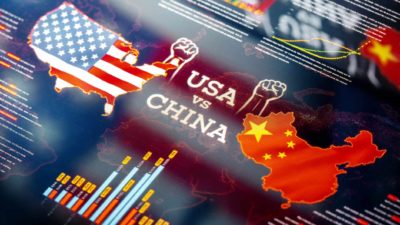It feels like there's a lot going on in the world, right now. Here's my Friday take on some of it.
Markets shrug… this time
The brutality of the Hamas terror attacks on Israel is tragic. The loss of Palestinian life in the aftermath is, too. And, for those of us who've been around a while, it seems like a horror movie, stuck on repeat.
The human toll – lives lost, injuries sustained, way of life shattered – is hard to comprehend.
And, frankly, it's hard to then simply turn to '… so here's what it means for markets'.
The problem is that markets – shares, bonds, property – continue to trade. And so an investor needs to account for the impact. And, as someone who's often asked for my thoughts on exactly that, I try to always keep the monetary implications in context. The human impact is far, far more significant.
With that said, I have been a little surprised by the muted market response to the ongoing conflict. In a parallel universe somewhere, the oil price has spiked to over US$100 per barrel, and the stock market is down 10%.
Not that those things should, necessarily, have taken place. But in times past, that sort of thing is precisely what has happened.
Why is it different this time? Perhaps the market believes this will remain contained to Israel and Gaza (we all desperately hope so). Perhaps there are other, bigger financial pieces of the jigsaw puzzle taking precedence (interest rates and sluggish economic growth chief amongst them).
For what it's worth, I'm just reminded of the folly of trying to guess short term market movements. It's why my investing is determinedly long term. Sometimes people ask me 'That's okay for you, what if I want to invest only for the next 12 months?'. My answer is as simple as it is hopefully honest: "I can't help you".
I can't give personal advice, but here's my general view: If I needed money in the next 3 – 5 years, I'd have that amount in cash, in term deposits. The rest, I'd invest in shares.
More importantly, I hope peace can be restored in the Middle East quickly, and with as few lives lost as possible.
High Court says EV tax is unconstitutional
You might have seen during the week that the High Court of Australia ruled that Victoria can't levy a 'road user' charge on electric vehicles, because that tax isn't allowed to be levied by a State under the Australian Constitution.
It throws other taxes and charges into doubt too, by the way – hopefully our lawmakers can solve that pretty quickly.
But it's worth thinking about whether a 'road user' charge is actually the right way to approach revenue anyway.
Not that I'm against it, necessarily.
But the argument that 'fuel excise will fall (because EVs replace combustion engines), so we need a new road tax' isn't logically supportable.
Yes, fuel excise will fall. Yes, we need to find more tax revenue to replace it. But there's no reason that revenue has to (again, necessarily) come from cars.
It's the equivalent of taxing sales of Nicorette because fewer people are smoking!
'But someone has to pay for the roads', they will say.
Yes. And someone has to pay for defence, primary and secondary education, and for public healthcare.
They all come out of consolidated revenue.
Again, I'm not against a road user charge, per se. But I am against the narrow, blinkered thinking that says rolling pieces of metal need – by some divine edict – to raise a certain amount of our tax revenue.
As citizens – and investors – we should avoid two traps. The first: the status quo effect. Just because something exists today, isn't justification for it to continue. The second? 'Framing'. "If we don't have a road user charge, we'll get less revenue from cars" is true. But that doesn't mean the choice is between a road use charge and less revenue.
We could simply raise it another way.
(And before you ask, no, I don't drive a Tesla. Or a Polestar. Or a BYD. I drive a Toyota Hilux. My wife drives a Prado. I'm not here to stick up for EVs. It's just a frustrating example of the narrowness of public policy conversation in Australia… and a lack of genuine vision or imagination.)
Fear, Uncertainty and Doubt
You might have seen there's apparently a new wonder-drug in town. Ozempic – a drug initially cleared for other uses, is reportedly the weight loss drug of choice for celebrities and Tik Tok influencers.
(I say 'reportedly', because, well, I don't follow celebrities on social media, and don't use Tik Tok. Now, get off my lawn!)
Aaaaanyway, the net result is that Ozempic (and other similar compounds) have investors in a spin. Medical device maker ResMed Inc (ASX: RMD)'s shares have fallen by around one-third on fears that the world will start taking Ozempic, we'll all lose weight, and no-one will have obesity-linked sleep apnoea, requiring one of ResMed's CPAP machines any more. CSL Limited (ASX: CSL), which has a treatment for kidney disease, has also suffered a fall in share price, because Ozempic may also have positive impacts in that area, too.
Now, look. I'm no medico. On one hand, I would love to think this drug has a real, widespread, and long-lasting positive impact for many people around the world. Maybe this is another serious breakthrough in medical technology.
Or maybe it's a good drug, which can help some people in some circumstances.
But a one-third fall in ResMed's share price? So early in Ozempic's existence?
Yes, it's possible that such a reaction is proportionate. Possible.
But likely?
That one-third of ResMed's future profits – from now until eternity – have been definitively wiped away because of the potential of a single compound?
I don't think so.
Again, it's possible. But if we invested only in companies that could never, under any circumstances, have any risks… well, we'd never invest.
Now, don't listen to those who say there's no chance Ozempic is a risk. But they're as silly as those who think it's a certainty.
Investing is the application of probability. We're literally in the business of pricing risk. Gold explorers are worth almost nothing… until and unless they find something, when they're worth a lot. And that's 100% appropriate, because most end up finding nothing!
Woolworths Group Ltd (ASX: WOW) is priced highly because investors don't believe there's much chance of the business collapsing. But that doesn't mean there are no circumstances in which it could be worth a whole lot less.
When we invest, we take on risk, in hope of being rewarded for doing so. My guess is that the reaction to Ozempic is meaningfully overblown. Not because there's no chance Ozempic is a new wonder drug, but because the market is reacting as if that's a guarantee.
Have a great weekend!
Fool on!









